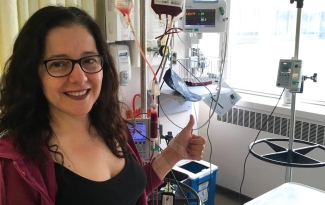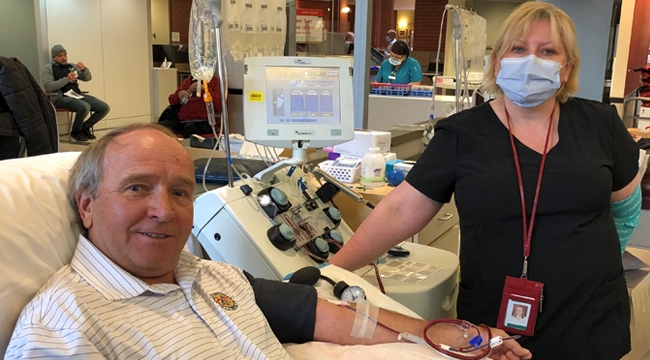How we help patients with rare diseases
Rare Disease Day takes place on the last day of February each year
Jakob Guziak has a very rare immune disorder. He is treated with a medication made from plasma and also requires a stem cell transplant.
The first-ever Rare Disease Day was marked in 2008 on Feb. 29. The date itself is rare, appearing on the calendar just once every four years. Since then, Rare Disease Day has been recognized annually on the last day of February, including in Canada.
According to the Canadian Organization for Rare Disorders (CORD), a rare disease is a condition affecting fewer than one person in 2,000 in their lifetime. Such conditions affect about one in 12 Canadians, two-thirds of them children.
Canada’s Lifeline supports many patients with rare disorders. They may need blood, stem cells or medication made from plasma. We’ve shared many patients’ stories over the past year. Here are just a few of them.

Jakob Guziak was just a few days old when he was diagnosed with adenosine deaminase severe combined immunodeficiency (ADA-SCID), a rare immune disorder caused by a deficiency in adenosine deaminase (ADA). It leaves him unable to fight off most types of infections, including bacterial, viral and fungal infections.
Jakob currently relies on immunoglobulin transfusions once every month. The medication is made from plasma, a straw-coloured component of blood. However, doctors say to survive long-term, Jakob requires a stem cell transplant.
Read more: Edmonton toddler with immune disorder urgently seeks stem cell transplant
How can I join Canadian Blood Services Stem Cell Registry?

Josie Sirna was diagnosed at age two with thalassemia, an inherited blood disorder that prevents the body from producing healthy red blood cells. She requires more than a hundred blood transfusions every year to maintain her health.
Read more: 4,400 units over a lifetime, and counting

Brothers Joiakim and Micah Felix (front left and front centre in the photo above) have both inherited sickle cell disease, a disorder which causes them to develop abnormal hemoglobin. Hemoglobin is the molecule in red blood cells that delivers oxygen throughout the body, so the boys have needed many blood transfusions.
Read more: ‘Superpower’ boost from donors helps brothers thrive with illness

Cayleigh Kearns was diagnosed with common variable immune deficiency (CVID) after suffering through high school with a nearly continuous series of illnesses. Her health improved dramatically when she began receiving immunoglobulin, a medication made from plasma.
Read more: Donated plasma lifts patient from ‘rock bottom’ to top student

Without immunoglobulin, Jeff Brown could have been permanently disabled by Guillain-Barré Syndrome. The medication made from plasma is one of the only effective treatments for the rare disorder, which causes the immune system to attack nerve cells.
Read more: Medication made from plasma spurs recovery from terrifying illness
Khoen Yatchuk has hereditary spherocytosis. His red blood cells are shaped irregularly, which causes his immune system to attack them. Last June, his mother Robyn Yatchuk thanked blood donors in the above video as part of our celebration of National Blood Donor Week.
Read more: Blood to sustain an active four-year-old
You can learn more about Rare Disease Day online, including ways to participate and show your support for patients. And for more stories about rare diseases and how Canadian Blood Services helps affected patients, visit our Stories page regularly.



